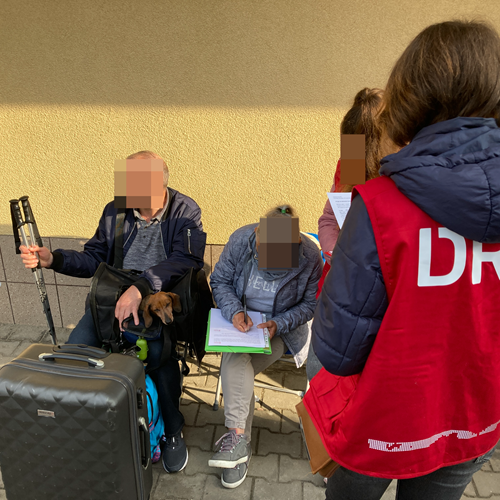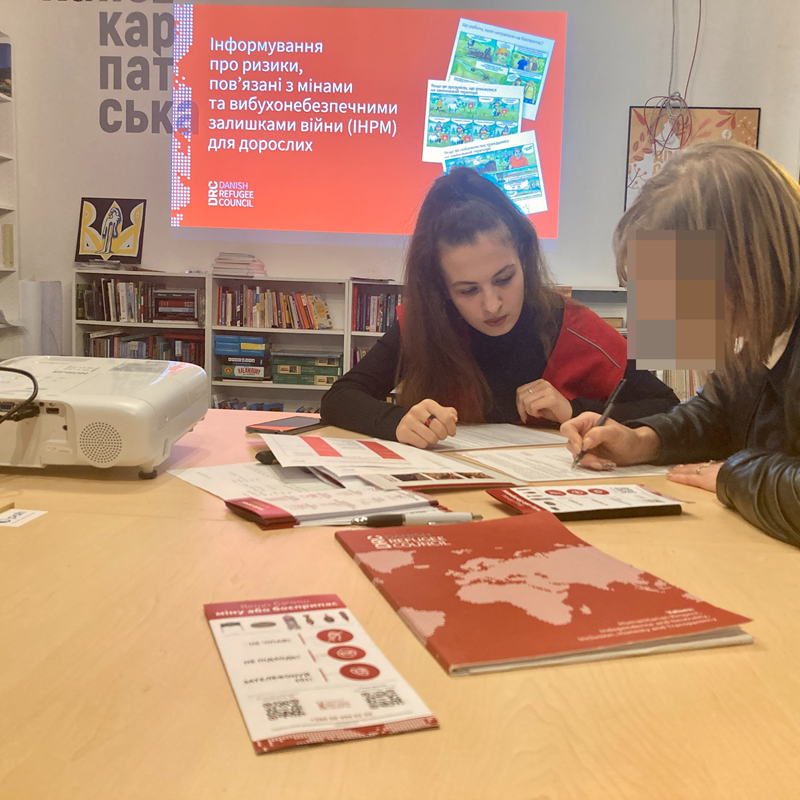Cut off from their families and friends in Ukraine, refugees hosted abroad maintain strong connections with their networks back home. They often tell DRC about their wish to return and to reunite as soon as the situation allows for. Preparing those who travels back to Ukraine with safe behaviour knowledge around remnants of war and explosive hazards is a core component of assistance provided by DRC Explosive Ordnance Risk Education (EORE) team and through partners at the Community Centres and Collective Centres hosting displaced from Ukraine, as well as state at border checkpoints, railway and bus stations.
In this framework, DRC is leading awareness raising campaign at the Przemysl railway station, including dissemination of information leaflets with short explanations on algorithm of safe behaviour, useful items to carry and how to read the warning signs. We meet Nastia* and Sasha* from Donetsk Oblast. Both are marked by the fear and experiences they have gone through. Nastia vividly recalls the day they chose to depart. It was a chilly period in 2014, during the initial stages of the conflict in Donbas, when hostilities began. She has been working as a journalist in Ukraine. Now, from a distance what she manages is that she writes articles mainly about the danger posed by landmines and other explosive remnants of war. Her articles vividly highlight the complex situation existing in the country as Ukraine is among the countries most contaminated by mines.
“As many people start returning home, they will inevitably find booby traps and explosive ordnances,” explains Nastia. The country is a battle area that is publicly accessible, and the consequences could be catastrophic. I believe that Ukrainians cannot even comprehend the scale of the danger” – says Nastia.
In this light, Explosive Ordnance Risk Education activities provided to Ukrainians who often travel to their hometowns, are of high importance. Using multiple communication approaches as well as providing community level risk education sessions, DRC EORE team travel across Poland to spread the knowledge of safe behaviour around Explosive Remnants of war.
We also meet Anna* who works for the Ukrainian House Foundation and took part in the DRC delivered EORE sessions. Anna is from Odessa, beautiful Ukrainian city at the seashore. For her personally Explosive Ordnance Risk Education is very important, as many Ukrainians do not consider the sea as dangerous area and they are not aware of risks connected to mines and explosive remnants of war that may be found in the sea and on the beaches.
Since September within the EORE interventions 39 offline/direct sessions have been held and 494 people informed in two districts of Poland – Podkarpackie and Mazowieckie voivodship. Awareness raising sessions will continue to take place in different parts of the country till the end of 2023, Gdynia being one among them.
*Names are changed to protect identities
DRC’s risk awareness project in Poland is made possible through the financial support of private foundations, primarily in Denmark.

